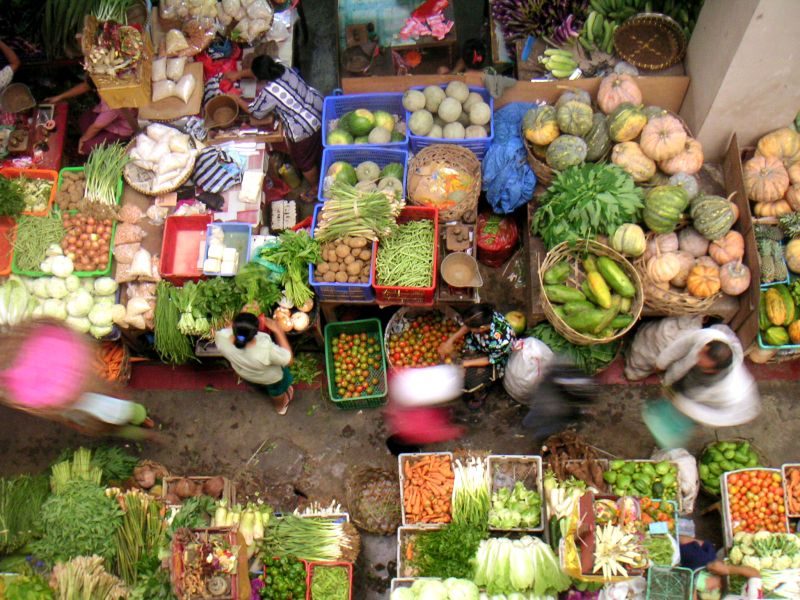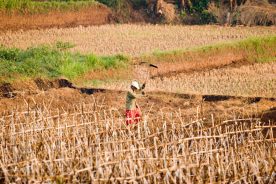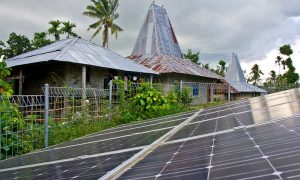The world has enough food to feed every person on the planet, now and in the foreseeable future. This should not be a surprising fact. The Food and Agriculture Organization (FAO) estimated that 2,950 kcal worth of food supplies were available per person per day from 2018 to 2020. This is projected to increase up to 3,025 kcal per person per day by 2030. For reference, the Recommended Dietary Allowance (RDA) from the Indonesian Ministry of Health is only 2100 kcal per person per day.
Despite this ostensible abundance, hunger is still a real problem for about ten percent of the world’s population, or more than 800 million people. In Indonesia alone, 20 million people, or almost twice the population of Jakarta, struggle to meet the RDA. It seems that, after all, we are missing the point by focusing on having enough food in aggregate.
Yet the latest innovation in Indonesian trade governance, the commodity balance or neraca komoditas, is designed specifically to ensure sufficiency. As regulated under the new Presidential Regulation 32/2022, the commodity balance is heralded as providing more certainty in import and export licensing and quota allocation by basing the decision directly on a national database of domestic supply and demand for the listed commodities.
The data are sourced from firms and government statistics and used to regulate imports of five pilot commodities: sugar, salt, fisheries products, rice, and beef. The list of commodity would eventually be expanded to include both food and non-food commodities in the agriculture, fisheries, mining, and industrial sectors.
As my colleagues at the Center for Indonesian Policy Studies (CIPS) write, the commodity balance is intended to help the government set import and export quotas in order to offset shortfalls and surpluses in the domestic market and achieve market clearing. The basic tenet is, of course, self-sufficiency, where import quota may not be granted at all should the balance show enough domestic production to cover domestic demand.
While the idea of a government database to determine food availability may be new in Indonesian food trade, and may actually help streamline the process by cutting out one step (applying for import recommendation), it is an old one in the history of food crisis, hunger, and the conceptual development of food security.
In his seminal work, Poverty and Famines (1981), Amartya Sen chronicles several case studies of famines, from the Bengal famine in 1943 to the Ethiopian famine in 1973-1975. In all these cases, famines occurred without a significant reduction in the amount of aggregate food available per head. Some famines even took place during the years with peak staple food production.
In the 1943 Bengal famine (which claimed 2-3 million lives), the British administration in India maintained a record of food availability and regular estimates of food shortages, calculated by comparing required amount of food per head and total food available. Based on the data, which Sen considers “fairly accurate,” the government found no reason for concern, and so the impending disaster went undetected.
Addressing food security in Indonesia
Food estates are costly and fail to value the application of ecological principles, especially local agroecological practices rooted in local communities.
This misguided emphasis on food availability and sufficiency rests on a complacent view that Sen calls “Malthusian optimism.” Thomas Malthus’ pessimistic worldview of the inability of food production to catch up with population growth has not been well supported by history, as technological advancements have proven able to multiply food production. Yet the Malthusian preoccupation with the ratio of total food supply to population remains entrenched, though now coupled with the confidence in domestic production and the ability of statistics, like the shortage records of the British India or, indeed, the commodity balance, to provide accurate estimates.
The CIPS paper on commodity balance casts doubt on the government’s ability to accurately determine available supplies, which is not unfounded given frequent disputes over stock figures among the ministries. Yet even if accurate reporting is somehow possible, as was the case in Bengal according to Sen, relying on it is detrimental to food security.
Despite the increase in rice price and inflation a year before the Bengal famine, Malthusian optimism led to ill-informed policies and outcomes such as import prohibition and late availability of imported foods when the famine became apparent.
Price is a better indicator for anticipating food shortages, but it is also missing from a non-automatic trade system like the neraca komoditas and its quotas. At the same time, prices of staple foods such as rice are higher in Indonesia than on the international market. Poor Indonesians, including rural populations and farmers who are mostly net consumers of rice, bear the heaviest burden of high food prices.
According to Sen, a better measure for access to food is entitlement, i.e. one’s ability to secure food, such as through own production or purchases. This establishes the connection between one’s livelihood mode, for example paid employment, and food security. A complete food security analysis then should look at livelihood situations of different groups of people, from urban dwellers to rural farmers.
Price is an important factor in one’s entitlement, but so are wages, lands, and other resources one has. To achieve welfare for its population, Indonesian food security policy should appreciate this diversity of factors and leave the decades-old pedestal of food sufficiency that it has been resting on.
 Facebook
Facebook  Twitter
Twitter  Soundcloud
Soundcloud  Youtube
Youtube  Rss
Rss 



